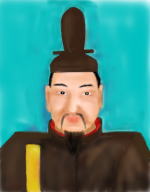A Child Prodigy, Dignitary, Exile, Resenting Spirit, and Deity
(C) Things About Japan

All those nouns in the title together describe how Sugawara Michizane lived and died. His life began on June 25, 845, the year of "Yin Wood Ox" when he was born into an esteemed family. His grandfather and father (Kiyokimi and Koreyoshi) had earned respect for serving as Doctor of Literature (for two generations consecutively) at the Imperial Court. His mother was from the Ohtomo Clan, a powerful family since the early sixth century.
Tracing back a little bit his ancestry, the Sugawara family came from the Haji Clan, the inventor of the Haniwa (sepulchral earthenware), dedicated to royal tombs. Furuhito, a great-grandfather of Michizane changed his family name to Sugawara and started his service at the Court using his top-notch literature skills. The government was boosting cultural development initiatives under the slogan "Strengthen the nation through academic activities." This movement peaked at the time of Emperor Saga (809 - 823).
Michizane was a very talented child, and people dubbed him "a child prodigy". At five, he composed a Waka (Japanese verse), and at 11, he created his first Kanshi (Chinese character poem). He received the degree of Bachelor of Chinese History and Literature at 18 (the youngest in history), and at the age of 23, he became Master of Chinese History and Literature (equivalent to a graduate school student today). He passed a challenging test to become a government official called Hō Ryaku Shi when he was 26.
He married at 30, and at 33, gained two key posts: Junior Assistant Minister of the Ministry of Personnel Affairs and Education, and Doctor of Chinese History and Literature. The latter almost equals to today's university faculty professor, and only two people had the degree in those days. Namely, he and Miyako-no-Yoshika, an eminent scholar and once Michizane's teacher. Yoshika was 11 years older than him.
After spending some time in the county of Sanuki (present Kagawa Prefecture, Shikoku) as Mayor, he returned to Kyoto when Uda became emperor, to assume the role of Private Secretary of Emperor. At 50, he took the position of Chief Envoy to China (Tang Dynasty). Considering that the dynasty was now in political turmoil and cultural decline, he proposed to stop sending envoys to Tang. The government approved his proposal. In 899, he became the Minister of the Right (equivalent to the Deputy Chief Cabinet Secretary) and in 901, received the Junior Second Rank.
His life seemed on an ever-thriving path. But, no one can flee from bad luck. Misfortune suddenly struck him, depriving of his position and condemning him to exile in Dazaifu (Fukuoka Prefecture) far away from the capital. Behind this, there was a conspiracy plot against him by his jealous opponent Fujiwara Tokihira, then the Minister of the Left. He made up a charge of treason and succeeded in removing his rival, thanks to a connection with the new emperor Daigo.
Life in Dazaifu was lonely and desolate. He began ailing, and his illness became even worse when he knew the death of his wife, who had been waiting for his return in Kyoto. Deep in sorrow and despair, he passed away on February 25, 903, without ever returning to his home again.
After Michizane's death, a series of tragic events happened in Kyoto. Natural disasters hit the capital, Fujiwara Tokihira, the plotter of the conspiracy died a sudden death at the young age of 39, and the Crown Princes consecutively passed away. Thunder hit the Imperial Palace in 930, injuring and killing many people.
Ancient people believed in resenting spirits, and they attributed all these terrible incidents to the rage of Michizane. To calm his anger and soul, people built a shrine on the land of Kitano, Kyoto in 987. Kitano was a sacred place for a heavenly deity of fire and thunder. Later, this god merged with Michizane, under the title of "Divinity of Heaven."
The following is the famous waka poem Michizane composed during the exile in Dazaifu. The verse goes as if he directly talked to the plum tree in his home garden in Kyoto:
Dear plum blossoms:
Catch the east wind
And send me your scent.
The master's not there;
But forget not spring.
A legend says after he created this poem, plum blossoms in his garden came flying over to see their master in Dazaifu. This story of "Flying Plum Blossoms" is loved by many Japanese.

|


